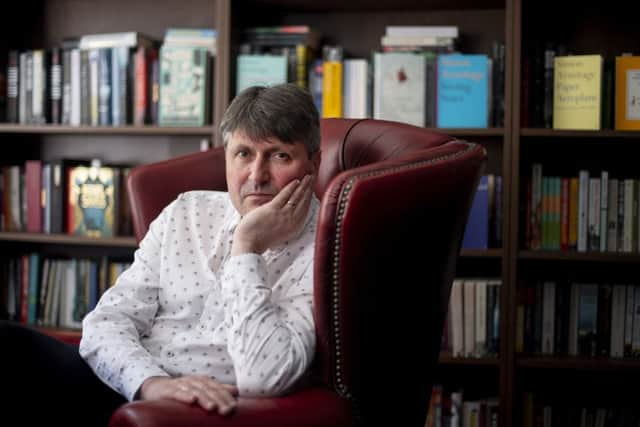Written on the wind by nation new


The author, playwright and former probation officer from Marsden in the West Riding, was unveiled as the nation’s wordsmith-in-chief, the 21st Poet Laureate in a list that includes William Wordsworth, Alfred, Lord Tennyson and Armitage’s personal hero and fellow Yorkshireman, Ted Hughes.
It was an honour he had accepted, he said, without hesitation, though others had reportedly demurred. His predecessor-but-one, Sir Andrew Motion, had called the role “very, very damaging to my work”.
Advertisement
Hide AdAdvertisement
Hide AdMr Armitage, who is 56 and professor of poetry at Leeds and until recently Oxford Universities, has published 28 collections of poetry. His work is on the national curriculum and in 2010 he received a CBE for services to poetry.
But, he told The Yorkshire Post, the verses he had carved onto rocks on the 50 miles of upland between Marsden and Ilkley as part of a project to celebrate the Pennines, were among the works he was most proud of.
“They are directed towards an audience of non-specialist readers who just happen to stumble upon the stones. It’s incredibly satisfying to think that I’ve been able to achieve some kind of communication on a poetic level with people who have just been wondering around the moors,” he said.
But if his six “stanza stones” represented, figuratively, the peak of his career, the feet would remain on the ground in his new role, he suggested.
Advertisement
Hide AdAdvertisement
Hide AdHis 10-year appointment, which by tradition had to be approved by the Queen, followed six months of speculation that began with the departure after a decade of Carol Ann Duffy, the first woman to hold the position.
Imtiaz Dharker, the Pakistan-born poet, said she had turned it down, although it was not clear if a formal offer mad been made.
Wendy Cope and Benjamin Zephaniah both ruled themselves out but Mr Armitage had appeared more positive, writing that the laureateship “should be the highest office in poetry” and the laureate the “guardian of those ideals”.
He said yesterday: “Of course I have concerns about the impact on my work, I’d be foolish not to. And I know that poets laureate have felt it’s had an adverse effect on their creativity.
Advertisement
Hide AdAdvertisement
Hide Ad“But I’ve always felt the boundaries and I can’t imagine that changing. The bigger issue might be about calls on my time.”
He said that although the office had changed enormously through the centuries, poetry was more important than ever in an age of instant and disposable communication on social media.
“The poetry of these islands is one of our greatest achievements,” he said. “In a hectic and sometimes frenetic age the combination of considered thought and crafted language is more relevant and vital than ever.”
It was the work of Ted Hughes, Poet Laureate for 14 years until his death in 1998, that “woke me up to poetry”, Mr Armitage added.
Advertisement
Hide AdAdvertisement
Hide Ad“When I was at school, there was always the sense that if he could manage this, coming from a terrace house in Mytholmroyd, why couldn’t I manage this coming from a terrace just over the hill.
“He made what sounded like an impossible journey seem a possible and exciting adventure. So that’s, one of the absolute thrills of this appointment. Ted’s poetry was there at the beginning for me.”
Theresa May, who as Prime Minister advises the Queen on the choice of Poet Laureate, said she was “delighted” at the appointment of “one of our most popular and respected poets”.
Dr Fiona Becket, head of the school of English at Leeds University, said Mr Armitage had “long been an enduring and powerful presence, and a shaper of contemporary poetry”, encouraging young writers, supporting activity which raised the profile of poetry and, in his work, exploring environments for new writing.
She added: “At a time when poetry is everywhere and is engaging wide and diverse audiences, Simon’s voice is central.”